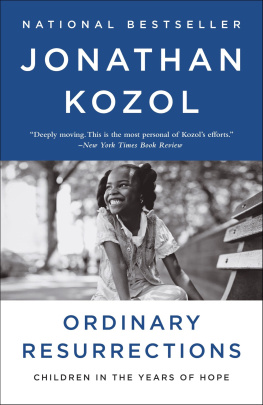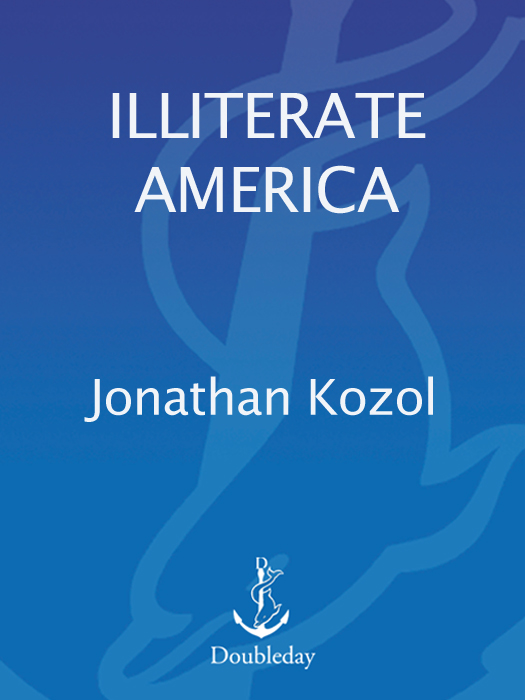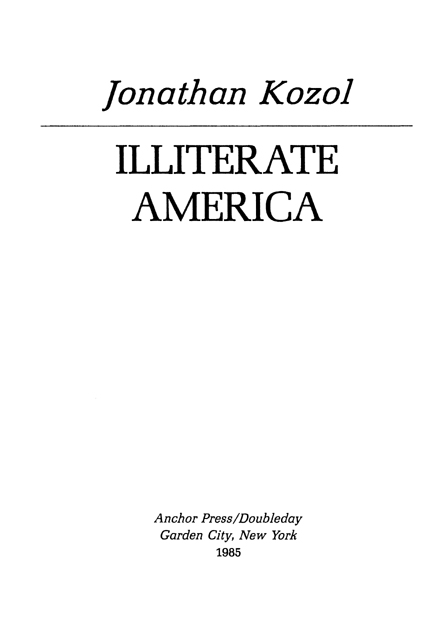Other Books by Jonathan Kozol
DEATH AT AN EARLY AGE
FREE SCHOOLS
THE NIGHT IS DARK
AND I AM FAR FROM HOME
CHILDREN OF THE REVOLUTION
ON BEING A TEACHER
Library of Congress Cataloging in Publication Data
Kozol, Jonathan.
Illiterate America.
1. LiteracyUnited States. I. Title.
LC151.K68 1985 370.973 84-20487
eISBN: 978-0-307-80057-2
COPYRIGHT 1985 BY JONATHAN KOZOL
ALL RIGHTS RESERVED
v3.1
For my mother and my father
This book evolved out of a year of study made possible by a fellowship granted to the author by the Humanities Division of The Rockefeller Foundation. I am deeply grateful to Alberta Arthurs, Steven Lavine, and the Trustees of the Foundation for their generous support.
The final writing of this book was completed under a fellowship from the John Simon Guggenheim Memorial Foundation. I would like to thank the Trustees of the Foundation and, in particular, Gordon Ray and Stephen Schlesinger for a vote of confidence which allowed me both the time and the reflection to deepen and rethink a work which has, in a real sense, been germinating now for almost eighteen years.
CONTENTS
PART ONE
Invisible Minority: The Growing Crisis of Illiterate America
PART TWO
A Plan to Mobilize Illiterate America
PART THREE
Beyond Utility
I cant help thinking of the Venetian Republic in their last half-century. Like us, they had once been fabulously lucky. They had become rich, as we did, by accident. They had acquired immense political skill, just as we have. A good many of them were tough-minded, realistic, patriotic men. They knew, just as clearly as we know, that the current of history had begun to flow against them. Many of them gave their minds to working out ways to keep going. It would have meant breaking the pattern into which they had crystallised. They were fond of the pattern, just as we are fond of ours. They never found the will to break it.
C. P. Snow
AUTHORS INTRODUCTION
It was in autumn 1964, fresh from Harvard College, from a term at Oxford, and from the indulgence of three years as an expatriate and social dropout on the fringes of the literary life on the Left Bank of Paris, that I returned to the United States and chose, for reasons which I do not wholly understand, to find a job within a fourth grade classroom of the Boston Public Schools. I had never read the works of Gunnar Myrdal, Michael Harrington, or Robert Coles. But it was in that year in Boston that I saw before my eyes a world of suffering, of hopelessness and fear, that I could never have imagined in the privileged and insulated decades of my childhood and schooling.
Up until 1964 I had been to Roxbury on very few occasions. Sometimes, on a Wednesday night, I had accompanied my father as we drove into the city to drop off the live-in maid who cleaned our house and cooked my meals and cared for me and for my sister six days out of seven. Thursday was the maids day off. I used to wonder what she did, whether she had children and a household of her own, whether she suffered for the time in which she could not see them, how they could manage with no mother in their home. I knew that she was both a competent and gentle-hearted woman. She could clean and she could cook and she could offer love unstinted. I knew she couldnt read or write. That didnt seem to count. She did not need to read in order to perform the work of polishing the silverware and scrubbing kitchen floors.
When I asked her one day whether she had children, she replied that she had three. They lived in Roxbury with their grandmother. I worried about this sometimes, but not often. Not by the intention of my mother and my father, but by the enormous distance that divided my suburban life from anything that happened on that distant street of darkened houses where we dropped her off on Wednesday nights, I was inoculated against pangs of conscience. My curiosity about her children and about their lives was rapidly dissolved as I proceeded to evolve the plans for my career.
In 1964 I learned at last, and with a wave of shame and fear that turned before long into an unbounded and compensatory rage, that the children of our colored maid had been denied the childhood and happiness and care that had been given to me by their mother. I knew now that these children had been robbed of childhood. I had not robbed them: I had been recipient of stolen goods. What had been stolen from them seemed unspeakable: a crime, an evil past imagination.
Few of the children that I met in 1964 knew how to read and write. In the springtime of their fourth grade year, most of those kids were lucky to be reading at the level of the second grade. As I came to know their families and friends I realized that their situation was the norm, not the exception. Their parents were not all domestic maids. A few had better jobs; a larger number had no jobs at all. A few could read and write and help their children to make up for what they lost within that medieval school; most of their parents could not read beyond a very limited degree. Many could not read at all.
In 1965 I rented an apartment in their neighborhood. I lived in that neighborhood, then in others not far off, for eighteen years. The children that I came to know during that year in Boston are no longer children now. They will not be given any second chance to live those years of their imperfect childhood again. Even in the richest, most developed and advanced society, you do not get to live your childhood twice.
People who read Death at an Early Age when it was published in the 1960s meet me today and ask me sometimes whether I know what happened to the children I described. What happened to Stephen? Angelina? Frederick? Did they somehow manage to survive?
Stephen called me from prison this winter. That is one answer to the question.
Frederick is not yet in prison. He is a successful pimp. He tells me that he deals in drugs. He cannot read. He is not married. He has several children he has never seen.
That is another answer.
Angelina has three children, lives on welfare in the neighborhood where I first met her as an eight-year-old. She cannot read the Boston Globe, advertisements for jobs, or welfare forms. She cannot read the homework papers of her children. She will not read this book.
That is another answer.
The senior editor of one of New Yorks largest publishers discussed with me the terms on which he would accept this book for publication. He did it in person, in his office, in a calm and reasonable voice. A book on ethics will not sell in 1985. If you could somehow give it a more hard-nosed focussomething like The Billion Dollar Errorsomething like that would hit the reader in the pocketbook I would like to do it Let me know
That is another answer.
In one of his greatest and most tortured works, William Faulkner told the story of a slaveowner named Sutpen. After certain years of muscular and ardent desperation, Sutpen won his stake of land and employed a team of wild slaves to make the black soil prosper. Sutpens sin was that he was unable to acknowledge his mulatto son. His fate was that of other men and nations that disown their young. The refusal to acknowledge those who are our sons or daughters, brothers, sisters, neighbors, fellow citizens, or former students, but whom we have relegated to statistical oblivion, holds some dangers that a sane society would not ignore. Societal denial of the crime by which it lives demonstrates political ineptitude and ethical betrayal; but it also tells us of that civic pride that goes before a fall.






